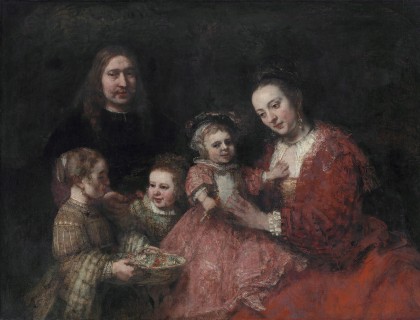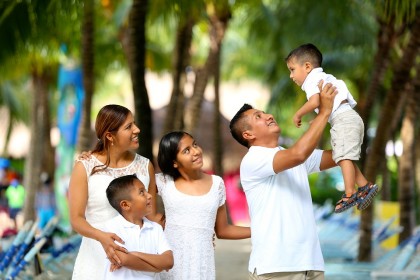Are parents “more important” than their children?
Kate Whittaker Cousino | Nov 15, 2017 | 1 cmt

On Facebook today, I ran across a clipping of an article by John Rosemond, entitled, "Your kids should not be the most important in the family." You can read the article itself online here, if you like. I actually first skimmed over the clipping post yesterday, when some friends praised it. It bothered me, but I wasn't able to put my finger on why until I gave it a more in-depth look today.
In the column, Rosemond says he asked a married couple with three pre-teen children to answer the question, "Who are the most important people in your family?" He then spends the remainder of the column explaining why their answer--"our kids"--is the wrong one, with a hefty dose of nostalgia and "kids these days" grousing thrown in the mix.
I went on to point out that many—if not most—of the problems they're having with their kids—typical stuff, these days—are the result of treating their children as if they, their marriage, and their family exist because of the kids when it is, in fact, the other way around. Their kids exist because of them and their marriage and thrive because the parents have created a stable family.
Furthermore, without them, their kids wouldn't eat well, have the nice clothing they wear, live in the nice home in which they live, enjoy the great vacations they enjoy and so on. Instead of lives that are relatively carefree (despite the drama to the contrary that they occasionally manufacture), their children would be living lives full of worry and want.
In one respect, this doesn't seem very different from the very popular oxygen mask analogy. The emergency instructions on airplanes always remind you to put your own oxygen mask on before turning to help others get theirs on. If your airplane is having difficulties and is losing cabin pressure, you can only help other people if you, yourself, are not in danger of passing out.
_.jpg)
In a family, it's important that parents make sure our own immediate needs are met so that we can meet our children's needs without becoming incapacitated. Because children look to their parents for food, shelter, and security rather than the other way around, everyone's well-being is dependent on the well-being of the responsible adults in the family.
The oxygen mask approaches the question of priorities from a pragmatic perspective. Caring for a caregiver's needs is a necessary pre-requisite before the caregiver can meet someone else's needs. It doesn't ask or attempt to answer Rosemond's question about who is "more important" because "importance" in the sense of pride of place, gravity, influence, significance is irrelevant to question of how to best meet the needs of the most people.
And that, I think, is why Rosemond's column irked me right from the beginning. There's a problem with the question itself.
To ask which family member is more important is arguably obscene. What if Rosemond asked, "which of your children is the most important?" Wouldn't we balk at the very question? Wouldn't we be troubled at being told that oldest children are the most important because they came first and have more to contribute, or that babies should be "second-class citizens" compared to older children or teenagers because of their greater state of dependence?
Rosemond's error is compounded in his analogies. He says,
The most important person in an army is the general. The most important person in a corporation is the CEO. The most important person in a classroom is the teacher. And the most important people in a family are the parents.
Rosemond wants us to believe that a parent "important" in the same way a general or CEO is "important." But the only way in which all of these people are "important" is in the sense of having a great deal of responsibility. The General is important because his or her decisions have great consequences for other people's lives; the CEO is important because his or her decisions can impact many people's livelihoods. But are they important in the sense of their lives, decisions, or needs having more significance than the life, decisions, or needs of soldiers or shelf-stockers?
Are they--and should they be--"important" in the way Rosemond says that we treat children as "most important"?

Rosemond's complaint appears to be that children who are "most important" will feel entitled to put their own accomplishments and ambitions above the needs or good of the family and, ultimately, of their community or country.
But if this is what it means, to Rosemond, for a person to be "most important," then he errs greatly in asserting that generals, CEOs, teachers, and--most of all--parents are and should be "more important" by virtue of their roles and responsibility. When a general, CEO, teacher, or parent puts their own accomplishments and ambitions above the needs and good of the people they each serve, it's not merely "entitlement"--it is corruption.
The person who is "important" in the sense of their decisions having wide-ranging consequences must not be "most important" when it comes to the content of those decisions. Selfishness in a child is a flaw. Selfishness in an authority figure is an injustice.
Teach your children to serve. Teach them to value family and community. Teach them to think of others and not merely themselves. Teach them the importance of compromise and balance in life with others. Teach them to accept and understand responsibility to themselves and to others.
But please don't teach them that marriage and parenthood is a competition for a limited pool of "importance."
"Importance" just isn't all that important where there is love.
There is neither Jew nor Gentile, neither slave nor free, nor is there male and female, for you are all one in Christ Jesus. (Gal. 3:28)
Image credits: Rembrandt [Public domain], via Wikimedia Commons; Mrs. Edwin Stephenson family portrait by Snyder, Frank R. Flickr: Miami U. Libraries - Digital Collections [No restrictions or Public domain], via Wikimedia Commons; Vacation Family picture via MaxPixel [CC0].

Comments (1)
Katie van Schaijik
Nov 17, 2017 9:16am
I'd never heard of John Rosemond, but I am almost breaking out in PTSD hives just reading about him.
When I was a young parent it was the detestable Ezzo method that was making the rounds in my circle. I fell for it, to my children's harm and my intense regret.
I have been hugely helped by a book called The Narcissistic Family, which is in some ways an elaboration of the insight you develop here.